
Cocteau told me that he and Moi'se were opening
a new night club and cafe in the Rue Boissy d'Anglas,
near the Rond Point, I saw Cocteau quite often
and met Erik Satie with him. Satie was a divine
old gentleman with a most malicious tongue and
diabolic face. 
We got on very well and I saw him
almost every day at the Dome. He lived at Arcueuil,
not far from Paris. No one had ever been to see him
except, I think, on one occasion, Jean Gocteau. I
liked him very much as he was quite old, and when
I was with him I always felt rather young and
girlish. I was at this time beginning to feel rather
old and wondered if I should not take on an attitude
of middle age. Now and then, when feeling really
depressed about my age, I would remember what
my Catholic convert aunt would say to me, " Those
that the Gods love always die young
She care
fully explained, I was eighteen at the time, that this
saying did not mean that one died at a youthful age
but that one's spirit remained young when in years
one was old. This I have found out is true as a most
divine lady. Lady EL, died not long ago at the age
of eighty-four, much younger in spirit than many of
the young things of to-day, who, as far as I can see,
have never been young at all. She had a most
wonderful figure, the figure of a girl of twenty.
Her face, it is true, was lined. I never, alas, met
her, but I have seen her dancing until the early
hours of the morning with all the best looking young
men in London. Satie had been a contemporary
of Debussy's and of Alphonse Allais,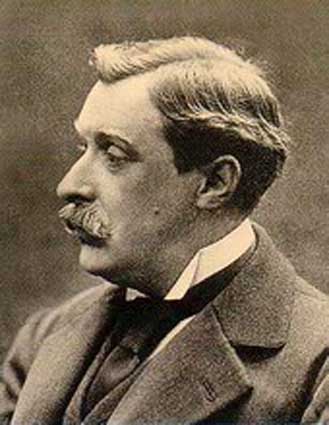
whose works

nobody in England has, as far as I can make out,
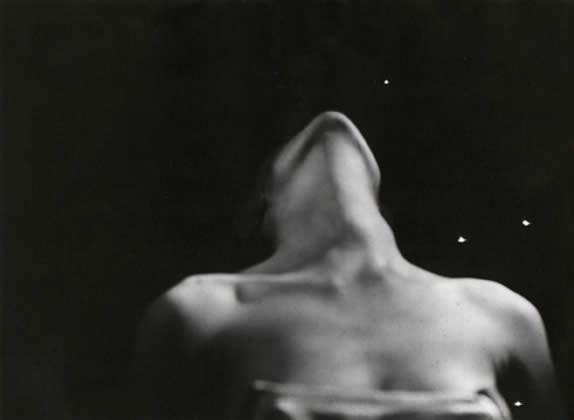
ever heard of. Allais was the first man to start the
fun and nonsense school of French literature and
was the man who said that " Mont Blanc a Fair tres
vieuxpour son dge" He also visited a French landlady
with a view of hiring a room. The landlady showed
him over her hotel, and, after having visited all the
rooms he said, " Madame est-ce que ily a des purtaises? "
The landlady was horrified and said, " Mais non,
Monsieur, mon hotel est tout a fait propre! " And
Allais said, " Madame, queldommage, autrement f aurais
pris une chambre toute de suite" Satie always carried
an umbrella, it was known as Le parapluie celebre.
I never saw him open it, but he always carried it.
After his funeral, to which I went and which I will
describe later, there was a sale of his possessions, and
I met Sauguet,
the composer of the Russian ballet,
The Cat, in London. He told me that he had been
to the sale and I asked him who bought the um
brella. He said that there were twenty umbrellas
and that he had bought fifteen. 
Moise and Cocteau told me that they had ar
ranged the date for the opening of their new cafe
and restaurant, which was to be called, " Le Boeuf
sur le Toit"
Marie Beerbohm saw Cocteau and
Radiguet quite often, and I was generally there too.
Radiguet adored Marie. Cocteau made us laugh
the whole time. We were talking of ghosts one
evening and Cocteau told us a beautiful ghost
story. There was a man one day waiting at the
Gare du Nord for a train and a man walked past
him whom he had not seen for years. He said
to the man, " Hullo, M., I thought you were
 dead and M. said, " Do you believe in ghosts? "
dead and M. said, " Do you believe in ghosts? "
And the man who was waiting for the train said,
" Of course not." And M. said, cc Well, I do," and
vanished into space!  Some years afterwards I met
Some years afterwards I met
a ghost at Juan les Pins, and a very unpleasant one
too. I will describe this later. 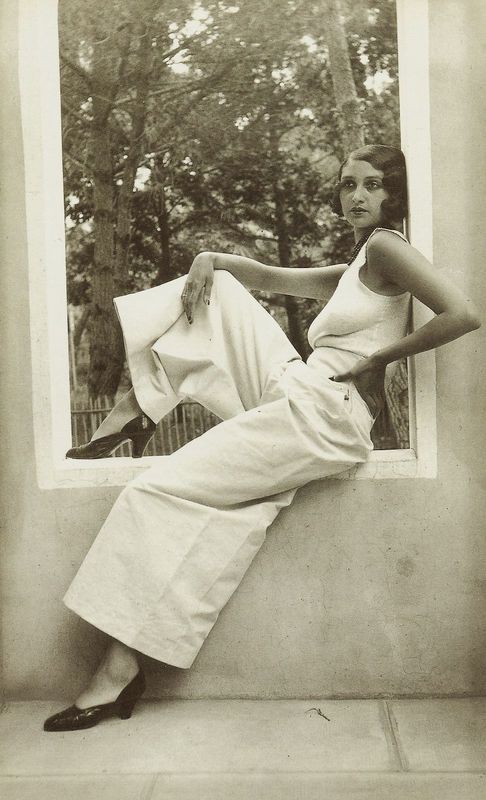
I made friends with a young French lawyer. He
did not speak any English and as a result of talking
to him my French improved. I introduced him to
Raymond Radiguet and he asked us both to dine
with him. The lawyer was only twenty-two and
quite amusing to talk to. At the age of fifteen he
had apparently become a cocaine fiend, but had
broken himself of the habit. We had a long and
complicated dinner, cocktails, red and white wine,
and ended by each smoking a very large cigar, to
the astonishment of the other diners, who looked at
us as if they thought we might all suddenly be sick.
A friend of mine, a very nice Spaniard, came to
Paris. He had been at Oxford and spoke perfect
English. He took me out to dinner at the RitZ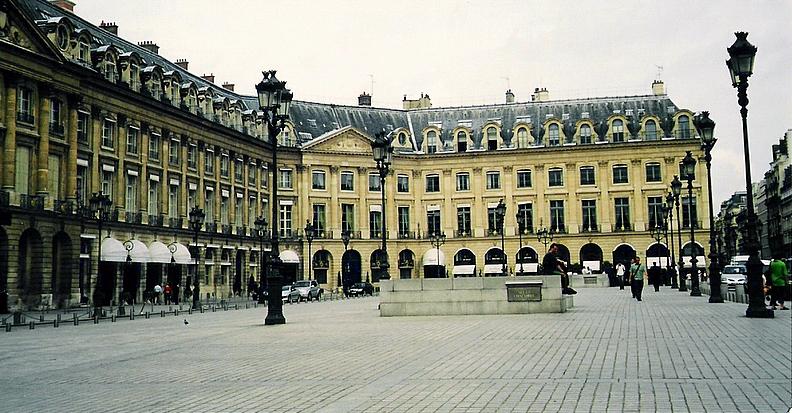 ',
',
and we told each other our adventures during
the past two or three years. He was one of those
very pleasant people who take the trouble to
entertain their guests. So many people expect
to be entertained the whole time. We both had
a great deal to talk about and had a very amusing
evening. I asked him if he would care to come
with me one evening to the Boeuf. Cocteau had
told me that one evening, some days before the
official opening he and some friends would be there.
I dined with the Spaniard at the Swedish Restaurant
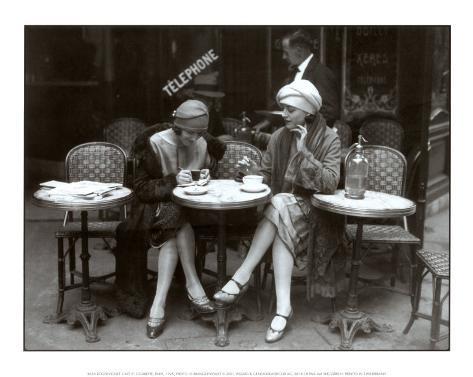
 in Montparnasse and we went to the Rue Boissy
in Montparnasse and we went to the Rue Boissy
cTAnglas about eleven o'clock. We found there
Marie Beerbohm, Picasso, Madame Picasso, Marie
Laurencin, Cocteau, Moise, Radiguet and Brancusi.
They were drinking champagne and we joined
them. In front of the entrance was a wooden
screen, one of the kind that will roll up, and everyone
was much intrigued with, and decided to experi
ment with it.
The Spaniard put it on the floor and
rolled himself up in it, much to the delight of the
company. He rolled and rolled on the floor. Some
times we caught glimpses of him and sometimes he
was entirely entwined with the screen. The evening
was an enormous success and I left for Montparnasse
with Brancusi and Radiguet, who had on a dinner-
jacket. Brancusi lived near Montparnasse and said
that he would see me home. We arrived at the
Dome at five minutes to two, just in time to buy
some cigarettes. Brancusi had an inspiration. He
said to Radiguet and me, " Let us go to Marseilles
now being very stupid, said that I must go
home.
I did not really think that he meant it and
went home to my Pole, Brancusi
and Radiguet, the
latter still in his dinner-jacket, took a train for
Marseilles a few hours later, without baggage, just
as they were. On the way to Marseilles they decided
that, being once started, they might as well go on to
Corsica. When they arrived at Marseilles Radiguet
bought some clothes from a sailor's shop and they
took the boat for Corsica. They remained there for
two weeks . I have never regretted anything so much
in my life as not having gone with them. The only
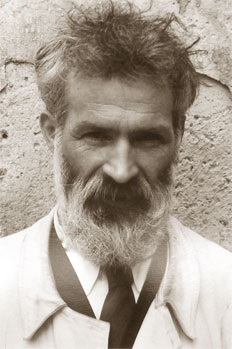 brancusi
brancusi
other thing that I regret was having married Edgar.
Anything else that I have done does not seem to
matter.
 Some nights after was the official opening of the
Some nights after was the official opening of the
A commanding self portrait. Lee Miller (1907–1977), Self Portrait,
c.1930, Gelatin silver print, 3 ½ x 2 1/8 in. (9.0 x 5.2 cm), Lee Miller
Archives, Sussex, England, Photograph by Lee Miller © Lee Miller
Archives, England 2011
.Boeuf sur le Toit. I was taken by the athlete. We
dined at a restaurant near the Madeleine and went
there about eleven-thirty. Cocteau, whom I had
last seen at the unofficial opening, showed me a
telegram which was from Corsica and from Brancusi
and Radiguet. It said that they were having a
splendid time and would return to Paris perhaps
soon and perhaps not. Cocteau was much dis
turbed at the complete disappearance of Radiguet.
We talked about it for a short time and came to the
conclusion that he would be quite safe in Brancusfs
care. They returned a few days later, having had a
wonderful time with the peasants and the Corsican
brandy. When members of the pre~War School of
Montparnasse went out " on the bust " they did
things in the pre-War style. It is a much better way,
I think, than going out for two or three evenings a
week. When once they started and that was not
very often, as they usually worked very hard, they
continued for days, and sometimes, if the money
held out for weeks. On one occasion, during the
fourteenth of July celebrations, Brancusi and Braque,
the Cubist, painted their faces in Cubist designs,
in red, blue, and white. I did, alas, not see them,
but I am told that they looked really fantastic.
They began by walking up the Boulevard St.
Michel. Everyone was so startled at their odd
appearance that they ran away in terror. They
 stayed out three days and three nights and finally
stayed out three days and three nights and finally
ended in Les Halles. That is what I was told, and it
is quite possible that, after Les Halles, they took the
train to Chartres.  The cathedral of Chartres and
The cathedral of Chartres and
the Palace of Versailles were two very popular
places for people who had been out for some days.
They seemed to have, especially Chartres, a curious
calming and soothing influence on them. I dined
often at the Boeuf sur le Toit,
with Marie. It
was quite a small place with one room only.
The
walls were quite plain with one or two photographs
of Stravinsky, Picasso, and Cocteau. At the end of
the room was a high bar with chairs where the
drinks were a little cheaper and were produced more
rapidly than if one was sitting down.
All kinds of
celebrities were to be found there and, at any rate,
the first year it was a most amusing and interesting
place. Moise was a most charming man. He was,
of course, Jewish, but was very tall and fair and I
would not have known it if I had not known his
name. It was here that I met Erik Satie. He did
not stay often in Paris for the evening, but when he
did he brightened up any place that he was in and
was most witty and amusing. Les Six had published
a small pink paper. It was not in the form of a book
but a large sheet which folded up. In this were
published various remarks of Satie; for instance,
written sideways round the edge of the paper was
" Monsieur Ravel a refusi la Ugion (Thonneur, mais toute
sa musique Vaccepte" Ravel had been offered the
Legion of Honour and had refused it. Satie simply
could not resist an opportunity to be witty and,

more often than not, very " catty. 35 There was
another remark of his that I thought very funny:
cc Quand fetais jeune tout le monde m j a dit, c Quandvous
aurez cinquante ans, vous verrez> maintenantfai cinquante
ans etje rfai rien vu* " I had some copies of this paper
which, unfortunately, I have lost. At the beginning
of the Boeuf there were hardly any English or
Americans. Mo'ise, I, Nancy Cunard, Iris Tree,
Evan Morgan, Tommy Earp and a few others, but
no tourists at all. Later on it became filled with
dreary and rich Americans, who simply got drunk
and either fought or fell asleep.

Tommy Earp was still rich and gave us a wonder
ful time. He seldom said, " Will you dine on
Friday, or lunch on Wednesday," but would arrive
at the Parnasse and suddenly ask, " Will you have
a small dinner with me? " The dinner nearly
always ended at seven-thirty a.m. in the markets.
On one occasion we took a taxi to Montmartre to a
restaurant in the Rue des Martyrs called UAne
Rouge.
It is a very expensive restaurant and
frequented almost entirely by French people. A
band played special tunes that Tommy called for
and we had a really stupendous dinner with white
wine, not champagne, but much better and nicer.
Tommy said that the night was too young to start
on champagne. After dinner we started out to
" do " Montmartre. We went to the Savoy and
ordered a bottle of champagne. This one has to do
in any case. The champagne in these night clubs is
mostly sweet and horribly expensive. The sweet
kind is really more drinkable than the sec, which

tastes like vinegar. There were lady dance partners
of all ages and sizes. There was one very fat lady,
far from young, dressed, or rather c "upholstered "
in red velvet. As I was very thin, Tommy thought
it would look very funny to see her dancing with me
and called her over. 
The lady was delighted and,
much to my embarrassment seized me round the
waist and whirled me round and round. Tommy
handed her twenty francs and insisted on her
repeating the process. I was becoming really
exhausted and we asked her to join us in some wine.
She sat down and entertained us with the story of
her life, which was much the same as that of any
other lady in any other night club. We then went to
La Pigalle, which is, I think, the gayest and most
which is, I think, the gayest and most
lively of all the Boites. There people seem to be
really enjoying themselves and, 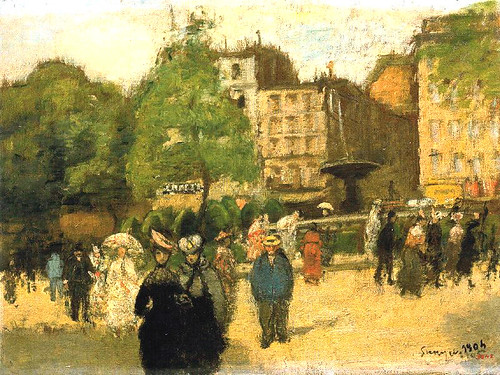
at most of the other
places, the gaiety seems to be forced. Paper
streamers were being thrown about, and little
muslin bags, containing coloured cotton-wool balls,
were handed to us to throw at our neighbours. In
the middle of the room was a table, and, sitting at it,
I recognized Little Tich. I was thrilled, as I had
seen him on the stage but never in real life. It was
impossible not to recognize him. In front of him
was a bottle of champagne in a bucket, and Tommy
and I pelted him with our stock of ammunition. I
hit him on the head twice, which I don't think he
liked much. I was a very good shot as I had learnt
the accomplishment of throwing straight from the
bathing-machine boys in Tenby. The third time
I hit the bottle of champagne, which was apparently

empty, as It rolled round the ice bucket and made a
clattering noise. We thought that Little Tich had
had enough attention and devoted our time to trying
to hit a fat blonde. 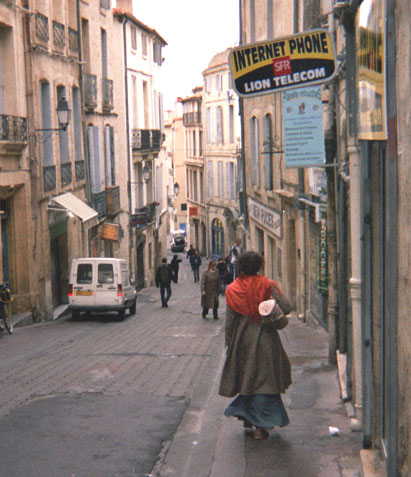
After a time we got tired of
Pigalle's and decided to move on. Tommy's pet
place was La Perle, in the Rue Pigalle,
quite
close to the Pigalle.
We went to see Angele, an
incredible old woman, who must have been a great
beauty in her youth. At the door was a small page
boy dressed in red with brass buttons. We found
Angele, who was dressed in a magnificent evening
dress of corded purple silk. She was very fat and the
dress was very low. When she leant over the table
the front displayed to view a very fat paunch. She
was delighted to see us and bought us a bottle of
champagne. Suddenly a row started between one
of the ladies, a very tall, fat one, and the page-boy.
They had a battle and finally fell on to the floor and
rolled over and over. This was a really funny sight
and I wish I had been able to do a drawing of it.
It was now about two a.m. and we thought that we
would see if the " Boeuf " was still open. We wan
dered down a side street in search of a taxi. The
street was very dark, there appeared to be no street
lamps at all. We saw a dark shadow which turned
out to be a taxi, and, standing beside it, was an
upright form, completely black. On our approach
ing it we found that it was a negro chauffeur. At
this time " Batouala " was having an enormous
success and we had the brilliant idea of hiring the
chauffeur and bringing him to the Boeuf and intro
ducing him as Batouala himself. We took his taxi,
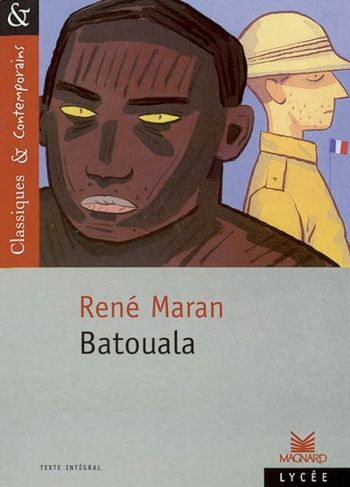
but unfortunately lost our nerve when we arrived.
The Boeuf was very lively indeed and I danced and
Tommy talked for some hours. We then went to
Les Halles and had supper or breakfast or both,
and some white wine, and returned to Mont-
parnasse about eight a.m. At the Dome, having
breakfast, was Sisley Huddleston , who Tommy in
, who Tommy in
troduced me to. He was perfectly charming. I
think I fell asleep shortly after,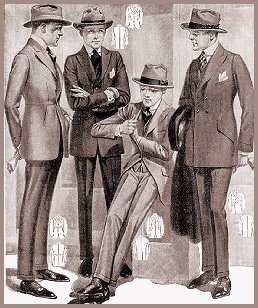
but no one seemed
to mind. I eventually woke up feeling rather ill and
went home -to bed. 
I had done a good many water-colours and
thought that it was time that I had an exhibition
in London.
I wrote to Mr. Turner of the Independ
ent Galleries, and he said that I might have one
in the autumn. As it was the middle of summer I
decided to go to London almost at once. Tommy
had already gone back and was living in his flat in
Regent Square. 
My friend, who wanted to get into
the Diplomatic Service and who sat for me, was
going back to England and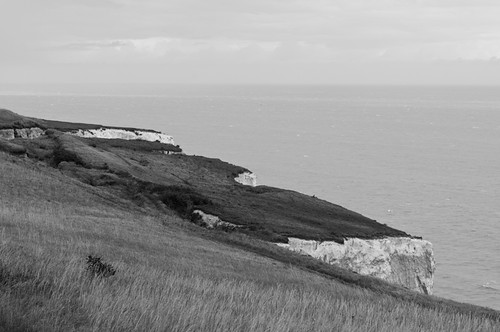
said that if I cared to go
back the same day on which he did, he would pay
the extra fare for me to go first-class Calais-Dover,
rather than third-class Dieppe-Newhaven, the way
the way
that I always went. I was delighted, The train
was packed. On the boat was a French Diplomatic
Mission, I think, with Monsieur Briand; any way,
there were glorious creatures in uniforms and
covered in medals. The boat was packed and we
had to sit on the deck on some life-buoy boxes and
dangle our legs. Suddenly the most handsome and
magnificent officer came up and shook my friend












dead and M. said, " Do you believe in ghosts? "
Some years afterwards I met
',
in Montparnasse and we went to the Rue Boissy



brancusi
Some nights after was the official opening of the
stayed out three days and three nights and finally
The cathedral of Chartres and






which is, I think, the gayest and most





, who Tommy in




the way






No comments:
Post a Comment